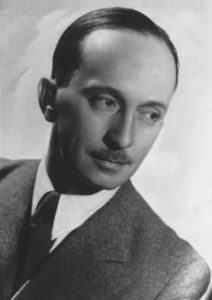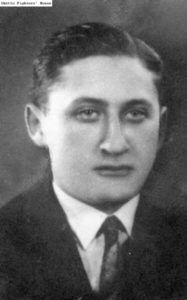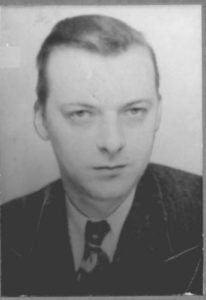Giving an interview for the Polish Radio’s International Service in 1954, Grażyna Bacewicz admitted she had composed her first pieces when she was a thirteen-year-old girl:
At that time I attended harmony and counterpoint classes at the Conservatory; composition wasn’t obligatory for me, if I may say so. Thus any attempts were spontaneous and voluntary. I couldn’t and didn’t want to resist them. These first attempts made me realise already at that time that my main goal in life would be writing music.
The vocation to compose revealed itself in Grażyna very early, and yet when she was young composing music seemed to be a typically male profession, especially when it came to “high art”, without any allowances. Grażyna struggled to make her way through multiple prejudices, even when she was already Kazimierz Sikorski’s composition student at the Warsaw Conservatory. She approached the oppression inflicted on her by her colleagues with detachment and humour, as is evidenced by a fragment of her notes:
‘Aren’t you lost? How may I help you? This isn’t University (I was attending philosophy classes as part of a university course, which I didn’t complete). This is a composition class, miss.’” This is more or less how my colleagues from Professor Sikorski’s class would greet me. Even after the professor entered the room, they continued their jokes. Smiling, Professor Sikorski calmed them down. I should be grateful to him; however, as I turned a deaf ear to jokes by Szałowski, Palester and Neuteich, my gratitude was probably unnecessary – perhaps only for his good intentions.
I wasn’t bothered by such needling. (To be honest, I can’t explain why I wasn’t bothered, because I really should have been). Composition lessons were generally individual, but all four of us were so keen on the subject that we all came to the lessons set for each of us individually. We didn’t like to miss a single word uttered by Professor Sikorski. The jokes and snide remarks about me didn’t last long, three weeks at most. The first one to stop was Neuteich, followed by the two others. Did they get used to me? Or perhaps they stopped regarding me as someone who was out of place? This was also true, but the main reason lay elsewhere. Instinctively – because this wasn’t deliberate – I adopted an attitude which must have restrained them. I simply paid no attention to their cutting remarks. Thus I took the wind out of their sails. We became great friends. All four of us.
- Roman Palester in the 1940s (BUW)
- Marian Neuteich (GFA)
- Antoni Szałowski (PWM)
Slowly but with real determination Grażyna was building up her musical reputation, combining a flourishing career as a violinist with composition. In developing her own style she was first helped by Kazimierz Sikorski, a pupil of Nadia Boulanger, who appreciated a solid, traditional technique, but was also open to experiments in modernising the compositional technique, especially when it came to harmony or instrumentation. Hence Sikorski’s favourable disposition towards Karol Szymanowski, whose favourite he was when Szymanowski served as rector of the Warsaw academy (1927–1929 and 1930–1932). Grażyna took over her professor’s ideological legacy, looking in it for possibilities to implement her own ideas. She was not a revolutionary, she did not want to discover unknown lands, break the rules introducing order into works. But there was also in her a need to experiment within a strictly defined framework. She very quickly joined the neoclassical movement, which flourished in the first half of the 20th century, becoming one of its most eminent exponents, only to reform her style later, giving it highly individual expression. The need to devote herself to creation was so strong in her that she was ready to give up her career as a violin virtuoso, which eventually happened in the mid-1950s. In 1947, on 14 August, she wrote to Vytautas, who was trying to build a career as a concert pianist in America:
I’m so surprised that you want so much to have a career as a virtuoso. I find it very cumbersome and, to be honest, I would prefer to be just a composer (…). The most important thing in the world is to create!
Grażyna pursued this goal with extraordinary passion, astonishing those around her with the speed of her work. She explained this in her characteristic way in another letter to her brother, dated 30 August 1947:
My pace of life is completely different from that of everyone around me, that is – I do everything faster than others and everyone around me keeps irritating me with their slowness. There are some advantages, however, because, for example, I can write a large piece in 2 weeks. Sikorski knows this. He sometimes asks me when we meet, ‘Well, how many symphonies have you written today?
The composer’s official catalogue contains four symphonies, but, in fact, there are six of them, including Symphony No. 1from 1938, eliminated from the official list of her works, and Symphony for String Orchestrafrom 1946. The last piece with the word Symphonyin its title appeared in 1953. Later works written for symphony orchestra no longer carried this weighty title. Did the composer conclude that the symphony as a genre was obsolete? Convinced that older aesthetic predilections needed to be revised, on 14 September 1966 she wrote to Vytautas,
Music has transformed itself so much over the last 20 years, not to mention 40 years, that I, for example, not only worry when my Symphoniesare played (fortunately v. rarely these days), but I would never agree to their second edition. Not to mention the fact that I would throw out a whole lot of pieces and would never let them be published or performed.
Artists’ oversensitivity with regard to their own oeuvres is well known. Fortunately, for the depositaries of their legacies what matters more is the artistic and historical value of the works than the artists’ fear they have not yet reached their desired ideal. Hence the growing interest in Grażyna Bacewicz’s early oeuvre, which has not been lost thanks to the foresight of her family. Believing that she should hone her skills and look for new paths, the composer nevertheless remained faithful to some principles, which she expressed in a letter to Vytautas written on 21 March 1947 in Paris:
Since you write a lot about your oeuvre, let me also say a few words about myself. Polish composers freed themselves from Szymanowski’s influence a long time ago and have since gone their separate ways. I follow quite a lonely path, because I care mainly about the form in my compositions. Because I believe that it’s like when you throw some stones chaotically in a heap, the heap will never turn into a building and will always collapse – the same with a musical work, there must be certain structural laws that will enable it to stand. Of course, these laws don’t have to be old – God forbid. Music can be simpler or more complex – it doesn’t matter – it depends on the composer’s language, but, in my opinion, it must be constructed well. I’m not talking about a good orchestration, this is obvious. I have thrown out my old compositions. Now, when I know more than I did, I see large shortcomings in these compositions, so why should they exist.
That Bacewicz’s correspondence with her brother was so prolific and that musical, professional topics occupied so much place in it stemmed from the fact that for Vytautas, who was four older than his sister, Grażyna was a true authority. He would often ask her for advice concerning various details of his works.
Relativisation of her own accomplishments, belief in the need to seek “progress” in art became with time nearly an obsession for the composer. At the same time her artistic “creed”, delivered colloquially, bluntly, in a form that was nearly “Pantagruelian” (Rabelais was her favourite author), which is characteristic of many of Grażyna Bacewicz’s unofficial pronouncements, places it among the defenders of the classical canon in art. What for Grażyna constituted a synonym of novelty was a new organisation of the sound material, independent of the major-minor system, but happening within a closed, logically constructed form. The pressure of the avant-garde abolishing all the rules was not yet as strong and noticeable in the period when she was active as a composer as it was in the second half of the 20th century.
My role is to do what I do tolerably, of course without standing still. So I will continue to write for our old instruments, but looking for new expression, by caring for the originality of the form, musical language and choice of instruments. What will come out of this – who the hell knows.
From a letter of 5 October 1958
One thing is certain, that we need to somehow break free from the old musical thinking. It seems so to me and I personally will never go back to compositions like Quartet No. 4(that award-winning one) or Studies for piano, but I will go forward with all my might.
From a letter of 24 September 1962
The composer also discussed with her brother the role of intuition in the creative process:
For me composing is like carving in stone and not transferring the sounds of imagination or inspiration to paper. Most composers in the world work systematically, like public servants. If there is no inspiration, you do technical work, if inspiration comes – you move slowly forward.
From a letter of 23 October 1958
This pursuit of order may have prompted the composer to appreciate the advantages of the dodecaphonic system, although she was quite reserved about it:
Discipline and strict discipline at that is, in my opinion, essential in composing. A house will collapse, if it is built without any rules. But since dodecaphony doesn’t really suit me – I’m working on my own system. (…) Dodecaphony is a very rigorous system, it has to be said. It’s good for acquiring skills as a composer. As a result it doesn’t quite satisfy me.
From a letter of 23 October 1958
She applied the dodecaphonic technique, although in a fragmentary manner, in herString Quartet No. 6from 1960. She treated it as an experiment, because, as she wrote after the premiere to her brother, “there is no progress without freedom of experimentation”. Years later, when summing up her oeuvre, she divided it quite problematically:
I move along the border between two worlds. However, my present music, with all its particular elements, is absolutely avant-garde in nature. I can even ‘boast’ of several ‘discoveries’ in the strings. I divide my music into three periods: I – youthful, very experimental; II – wrongly referred to here as neoclassical, though, in fact, it’s atonal; and period III, in which I still am. I’ve arrived at this point through an evolution (not revolution), through Music for Strings, Trumpets and Percussion,String Quartet No. 6 (serial to some extent), Sonata No. 2 for violin solo and Concerto for Large Symphony Orchestra.Works that are the most characteristic of my aesthetics of period III are: String Quartet No. 7, Pensieri notturnifor chamber orchestra,Concerto for Two Pianos and Orchestra, and Concerto No. 7 for violin and orchestra. Not wanting to make life difficult for the performers and also because I don’t like chance in music, I notate my compositions traditionally – even those fragments that have all the marks of aleatory technique. It takes a lot of effort. Naturally, there are problems or effects for which – not knowing an equivalent in the old notation system – I use my own notation.
After draft responses to an unknown survey – 1960s
It is difficult to argue with the composer today about her understanding of “the avant-garde”, which she saw only in the technical innovations of the mid-20th century. Similarly, another sensitive topic for her was “neoclassicism”, seen in her days in historical terms and additionally anathematised under the impact of Theodor W. Adorno’s criticism.
Grażyna Bacewicz was admired but also sometimes criticised. Yet she stoically ploughed on. In a letter to Vytautas of 23 September 1959 she wrote,
My motto: to try to do what I do as best as I can without thinking about the consequences, because we really have no influence on them. For example, I can’t help it when people will say in the future, that my oeuvre is not on a par with that of Brahms. I have less talent than he had and I can’t do anything about it. And yet perhaps some of my ‘pieces’ will be useful to somebody for some purpose, and that’s enough for me. I think even about this, because I know that soon, e.g. in 1000 years, there will be a time when our culture will have perished, so what is it all about? Those few hundred years? To be completely honest, I compose, because I find it pleasurable. Only when I got rid of silly ambitions, did I acquire inner peace. Silly ambitions are the desire to become popular etc.


